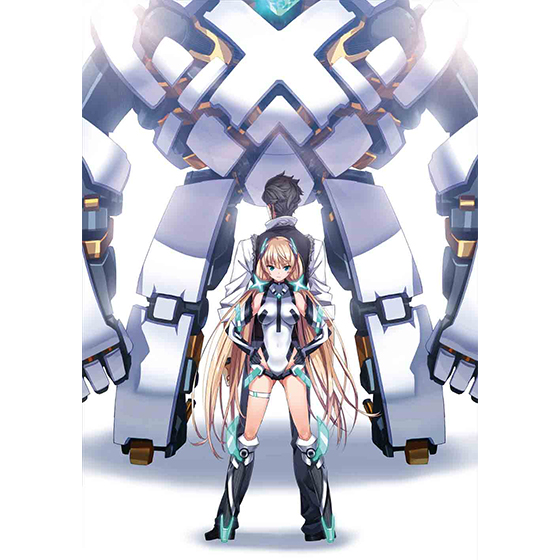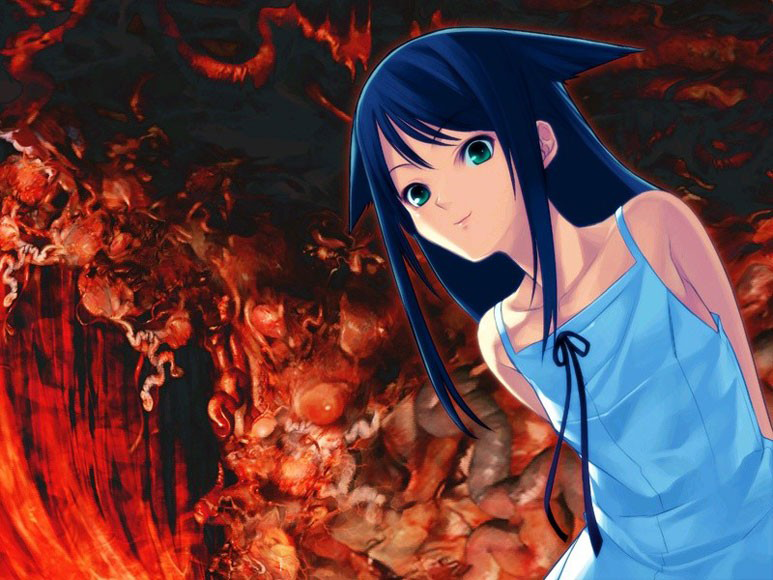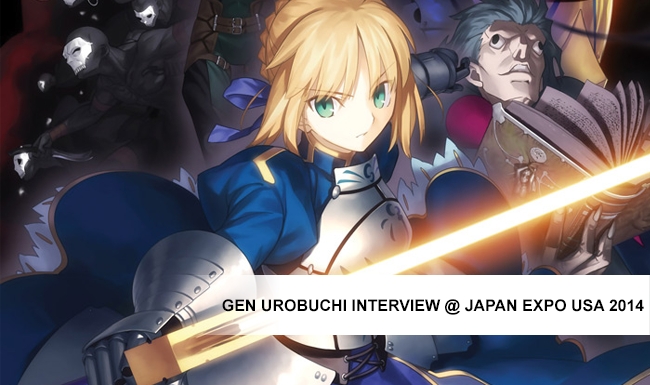Also known as "Urobutcher," Gen Urobuchi has penned some of the most notorious anime scripts for series such as Fate/Zero and Puella Magi Madoka Magica. Famous for taking his audience on a journey full of unexpected twists and turns, Gen has worked on stories across multiple mediums including the live-action Kamen Rider Gamen along with some of Nitroplus' quintessential visual novels Saya no Uta and Phantom of Inferno. His upcoming anime film Expelled from Paradise is slated to open in Japan later this year on November 15. Together with Nihongogo, join us as we learn about the man behind some of the anime world's most nefarious villains, [contract anyone?], as he shares his thoughts on his craft and how he goes from pen to script.
T-ONO: Please introduce yourself, and if you were a character from Fate/Zero who would it be and why?
Urobuchi: I don't want to be any of them at all [haha]. It's really hard to choose, but let me introduce myself first! My name is Gen Urobuchi and I am one of the scriptwriters for Nitroplus. I have been working on a lot of animation works lately and haven't had a chance to work on any games, but I do write novels and video game scripts.
Back to the topic, it would be very difficult for me to choose who I want to be from Fate/Zero because when I create each character I distribute my thoughts equally between them. Although, I do admire the way Iskandar lives his life.
N.G.: Fans are excited about your upcoming movie Expelled from Paradise. Can you tell us a little bit about it?
Urobuchi: It is actually an old project. I was offered this job before I started working on Madoka. This was an interesting project because it was more focused on technical experimentation. After watching Precure's ending using 3DCG to show them dancing, they wanted to make an anime all in 3DCG.
When I work on a project I prefer to work on the script with the director, but we did not have one at the time. I told them to get back to me when they decided on the director. Once Seiji Mizushima, director of Gundam 00, was chosen, we had a discussion about the movie and I began working on the script for it.
T-ONO: As your first work in 3D, what are your thoughts on the process for the film?
Urobuchi: At the time, this project was a very challenging idea. There weren't a lot of anime that was done fully in 3D in Japan. Ever since Arpeggio of Blue Steel and 009 Re:Cyborg was released over the years, the concept of full 3D anime wasn't new anymore. I felt that we were late on releasing the project in that point of view.
I feel that it's a good thing that the staff is more familiar in using 3D graphics. I felt we were able to make something great through that experience.
N.G.: What was your biggest challenge for creating a live action world in Kamen Rider vs one in anime?
Urobuchi: It's really different from working on anime. When you create scripts for live action, the situation varies depending on the condition of the set. I had to quickly change the script or how the characters acted depending on those situations. If you don't, something unprecedented might happen. During filming, I would need to change things on the spot and I don't get to see how it turns out until the final product is shown to me. There is a higher possibility that the final product will come out differently compared to the script.
When working with animation, you don't have to consider these. In anime, when we start animating the script, we can easily modify the script because we can see the outcome during the process of creating the storyboard.
T-ONO: In addition to animation and live action, you've also written scenarios for visual novels such as Saya no Uta and Phantom of Inferno. Can you walk us through your process of conceptualizing a script from beginning to end?
Urobuchi: It's the same way as I write a novel. If the game has multiple branching points that could change the whole story around, I don't think it will go as smoothly as writing a novel. Even though visual novels are more of a visual medium, I go from beginning to end like I am writing a novel.
T-ONO: When you were writing these scripts, did you ever think that there would come a day when these stories would be released in America?
Urobuchi: When I was writing, I never thought that they would be appreciated in America or any other country. I'm actually very honored and proud of it.

T-ONO: What has been the biggest challenge when writing original content versus adapted content?
Urobuchi: I've never really worked on a script that is adapted directly from another content. The closest really would be Fate/Zero, although it's only a spin-off. However, when it comes to writing original content it is a lot more fun almost like going to an amusement park.
Sometimes I might hit a wall when I'm writing original content thinking whether this scenario is good or not. For adapted content, I usually read and enjoy the original content as a fan, so it's easier to write the script for adapted content.
N.G.: How much input do you give artists when designing characters for your stories?
Urobuchi: I don't think I give that much input at all. Features such as costumes that has important meaning to a story, their gender, or nationality, I would tell them to keep. Other than that, I give them complete freedom.
For example, in Saya no Uta, when I first wrote the script, Saya had short hair but the character designers designed her with long hair. I liked how she looked with long hair, so we kept the long hair.
T-ONO: If you could go back and essentially save any character from any of your stories who would it be and why?
Urobuchi: This question is actually very difficult for me as I don't feel that any characters need to be 'saved.' This might be weird for some people, but for me I don't really have the mentality of 'killing' a character when I write a script. My characters are alive, but when they die they are no longer a part of the story. I don't feel like I've really killed anyone because they lived their lives up to the moment they died.
Not everyone lives until they are 100 years old right? They might die one day, but that doesn't mean their life was wasted. They lived their lives up to that point and I don't feel their lives are meaningless when they die.
For example, at this moment we are talking inside this convention center, this could be part of a scenario in a book. During this event, someone could die in a car accident. Was that person's life meaningless because he or she died? No, that person has lived their life up to that point and that's what matters.
I have similar feelings to my characters when I write the script for them. Also, the characters never really die, you can still go back a page and see them those characters alive again. I feel my characters are immortal, so they don't die.
T-ONO: Lastly, do you have any messages for your fans in America?
Urobuchi: I'm very pleased and thankful that people in America are enjoying my stories even though there's a language barrier between us. I feel like Americans are more passionate about their hobbies than Japanese people. I am honored that something I created is being appreciated by people. I promise you that I will continue to try my best so that you will continue to love my works.
T-ONO: Thank you very much.
Urobuchi: Thank you very much.
Special thanks to Emmanuel Bochew for interpreting
Special thanks to Cesar Ramos from Nihongogo
Translations by Arthur Arends
Disclaimer: we have retranslated Gen's questions to Nihongogo's questions in our own words

